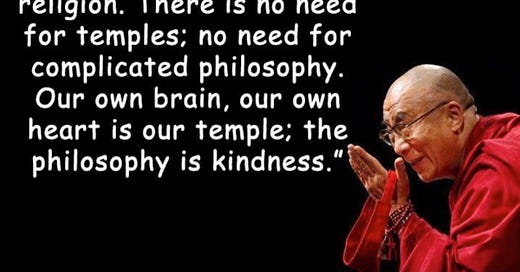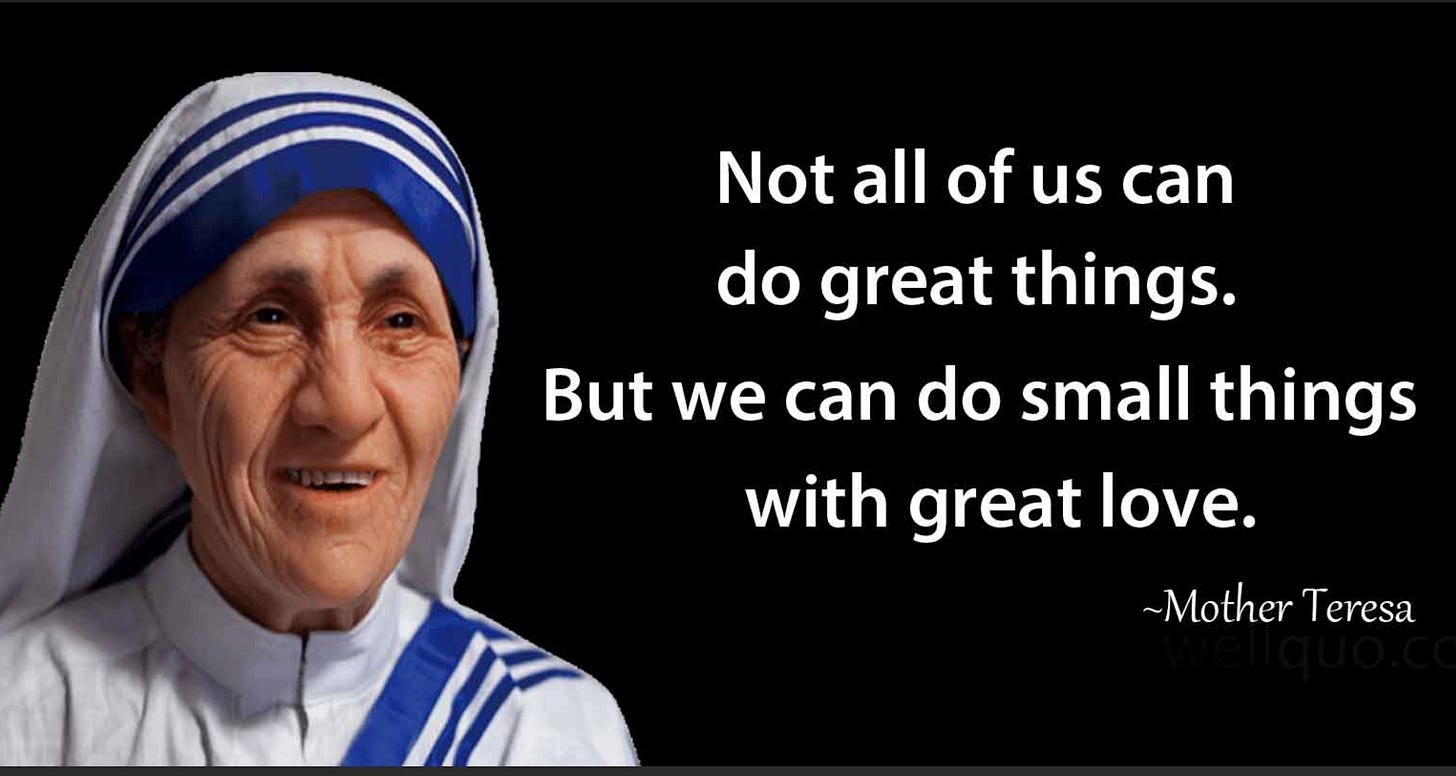Radical Kindnesss: A Transformative Force
Are We Working to Make a Difference or Just Noise in the System?
Radical Kindness: A Transformative Force
In the conclusion of yesterday’s post, I briefly discussed the Dalai Lama’s views on kindness as his religion. Today, I will explore the transformative power of the radical kindness he describes as his faith.
The Necessity of Kindness
The idea that the world could use a lot more kindness is commonly accepted. Most people acknowledge the importance of treating others as we would like to be treated, a principle embedded in the moral teachings of various traditions and philosophies. We generally assume that if we show kindness to others, they will return that goodwill, fostering mutual respect and harmony. However, when faced with rudeness, discourtesy, or even cruelty, the instinctive response is often to reciprocate in kind. Radical kindness challenges this impulse, advocating for an approach that transcends mere reciprocity and actively seeks to transform human interactions for the better.
What is Radical Kindness?
Radical kindness is not simply about responding to kindness with more kindness; it is about extending goodwill even in the absence of it. It requires a deliberate and proactive effort to treat others with empathy, generosity, and compassion, regardless of how they behave toward us. This approach is rooted in the belief that kindness has a transformative power capable of reshaping relationships, communities, and society itself.
The Ripple Effect of Kindness
One of the most profound aspects of radical kindness is its ripple effect. Acts of kindness, particularly when unexpected or undeserved, have the potential to inspire others. A single kind act can encourage the recipient to extend kindness to another, setting off a chain reaction that spreads far beyond the initial gesture. This phenomenon mirrors the ripples created when a stone is cast into a still pond—small at first, but growing wider and more influential as they extend outward.
Historical Examples of Radical Kindness
The transformative power of radical kindness is well documented in history and personal experiences. Consider the Civil Rights Movement, where leaders like Martin Luther King Jr. practiced nonviolent resistance rooted in the belief that love and kindness could overcome hatred. Their approach not only changed laws but also shifted societal attitudes over time. Similarly, in everyday life, individuals who choose to respond to hostility with understanding often defuse conflict and open the door to meaningful dialogue and connection.
The Dalai Lama and Compassion
Another prominent practitioner of radical kindness is the Dalai Lama, whose teachings emphasize compassion and love as central to human well-being. Despite facing exile and oppression, he has consistently advocated for peace, understanding, and kindness, even toward those who oppose him. His commitment to nonviolence and empathy serves as an enduring example of how radical kindness can bridge divides and promote healing in the face of adversity.
Other Notable Practitioners
Other examples of radical kindness can be seen in figures like Mahatma Gandhi, who led India's independence movement through nonviolent resistance, and Mother Teresa, who devoted her life to serving the poorest and most vulnerable. These individuals demonstrated that true strength lies in compassion and that radical kindness has the power to create profound and lasting change.
Practicing Radical Kindness in Daily Life
Practicing radical kindness requires strength, patience, and a commitment to seeing beyond immediate reactions. It involves recognizing that those who exhibit negativity may be struggling with unseen burdens. By choosing kindness even in difficult circumstances, we challenge cycles of negativity and create opportunities for healing and change.
Radical Kindness in Activism
Radical kindness offers a path forward in a world often fraught with division and misunderstanding. It is not about passivity or allowing oneself to be taken advantage of but rather about actively choosing to break patterns of negativity through compassion. By embracing this principle, we do more than just improve our own lives—we contribute to a broader cultural shift that fosters empathy, cooperation, and human connection.
Conclusion:
When I become agitated or angry about injustices and cruelty and consider how to act as an activist for a cause I am passionate about, I find it helpful to do what I refer to as a value check on my potential response. Am I going to respond in a hateful and resentful manner protesting that injustice, or am I instead going to seek a way to express kindness to the victims of that cruelty and injustice, demonstrating a better path and leading to a better, more just, and equitable outcome? This is the contrast by what I mean by seeking to express radical or transcendental kindness as a response to cruelty and injustice.
This is why I strongly advocate for not merely resistance to the Trumpian MAGA cruelty, injustice, and inequity but opposition that supports an alternative agenda of radical kindness, compassion, and empathy through good works and actions to mitigate the cruelty of the Trump agenda. Imagine, if you can, not only millions marching in the streets with signs and screaming protests to Trump’s agenda but millions volunteering and helping in thousands of ways to mitigate the MAGA administration’s cruelty with acts of radical kindness for the victims of his cruelty.
So, my advice to my fellow activists is to conduct more value checks using the standard of radical kindness in our activism. Will our activism make a difference, or will it be only noise in the system? Are we only resisting or advocating for an alternative agenda of radical kindness? Let’s try to throw more kindness pebbles into the pond to spread the ripples of kindness ever wider and create the kind of society and world we would like to see. We can make a difference by living our values and reflecting them in our activism.






